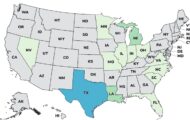Botulism was in the news this year, after an outbreak in California that was tied to cheese sauce sold at Valley Oak Food and Fuel in Walnut Grove, California. That outbreak sickened 9 people and killed one person. All of the patients in that outbreak were hospitalized in serious condition.

The CDC has released its National Botulism Surveillance Summary for 2015. It states that a total of 199 confirmed and 14 probable cases of botulism were reported in 2015. Infant botulism accounted for 71% of the cases, foodborne botulism for 20%, and wound botulism for 8%. Infant botulism can be caused by giving babies honey, which can contain botulism spores. Adults are resistant to spores from honey.
The 39 cases of foodborne botulism were reported from seven states. There were five outbreaks, or events with two or more cases, that accounted for 37 of the 39 illnesses. One outbreak was associated with home-canned potatoes in a potato salad served at a church potluck, one was associated with fermented seal flipper, and one was associated with beets roasted in aluminum foil, then kept at room temperature for several days. One death was reported.
Clostridium botulinum bacteria are found in soil throughout the country. The bacteria grows in an anaerobic environment. The most common food associated with botulism toxin is canned food, especially improperly canned low acid foods such as vegetables and meat.
The bacteria form spores under inhospitable conditions. When conditions become more favorable, the spores grow and can produce the botulinum toxin. It takes just a minuscule amount of the toxin to kill an adult human.
To prevent botulism poisoning, always follow instructions when you can food at home. Some foods, especially meat and vegetables, should be pressure canned. Contact the extension agent of your state university for more information about home canning.
In addition, don’t eat canned food if the container is bulging or if the food smells spoiled, although taste and smell aren’t good indicators of botulinum presence. Don’t wrap potatoes in foil before baking them, then store them. If you do this, eat the potatoes while they are hot, or store them without the foil. And don’t make infused oils at home; garlic or herbs can contain the bacteria, and oil is an ideal growth medium for the bacteria. And don’t give honey to babies under the age of 1.




